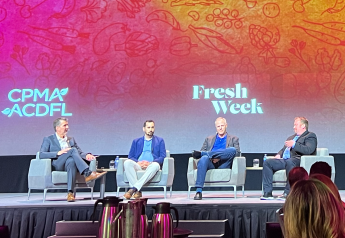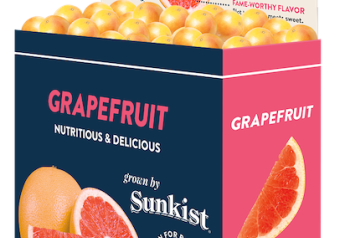Berries, salads continue to set organic sales pace

Organics continue to roll up sales gains in the produce category.
According to numbers from The Nielsen Co., organic produce grew 9% in dollars year-over-year and represented a 10% share of total produce as of Aug. 26.
The numbers show sales of organics are vigorous, but that may be just part of the story, said Andy Tudor, business development director with Selah, Wash.-based Rainier Fruit Co.
“Consumers are buying larger packages of organic berries,” Tudor said. “Instead of pints and things, they’re buying 18 ounces or up to 2 pounds.”
The numbers show prepackaged salads continue to lead organic sales, with 3% year-on-year growth in 2017, according to Irwindale, Calif.-based Ready Pac Foods, a subsidiary of Bonduelle Fresh Americas.
“Within packaged salad, consumers are voting with their dollars for complete meal kit solutions whether in bags or bowls,” said Nannette Richardson, Bonduelle’s vice president of marketing.
Health and user-friendliness are helping to fire sales of organics, said Jacob Shafer, senior marketing and communications specialist with Salinas, Calif.-based Mann Packing Co.
“Consumers continue to seek out healthy meal alternatives that are convenient,” he said, citing his company’s new Organic Super Blend as an example. The product has kale, colored carrots, green cabbage and broccoli, with a mix of flavors and textures, Shafer said.
“The product stands out on the shelf, offers exceptional versatility and can be served on its own or incorporated into dishes like salads, smoothies or other meals.”
Lettuce and berries continue to dominate the organic category, combining for nearly 30% of organic sales in the U.S., said Michael Castagnetto, vice president of global sourcing with Eden Prairie, Minn.-based Robinson Fresh.
Apples and spinach are the next largest organic categories, with 9% and 8% of sales, respectively, Castagnetto said.
Overall, only 14 categories make up 80% of organic produce sales, compared to 20 categories within the conventional space, he said.
“Spinach, kale, greens, Swiss chard, leeks and beets are items that retailers may consider carrying an organic option for, only to trade consumers up from a conventional purchase,” he said.
The most dramatic year-on-year growth within the organic category is in items that claim a smaller share within the segment, Castagnetto said.
Such commodities as limes, cherries, beets, avocados, beans and lemons — had 20% to 30% growth over the previous 52 weeks, even though those items account for only 4% of organic produce sales, he said.
Larger categories also are growing. Among those, organic berries grew 29% year over year — all varieties are contributing to this. However, blackberries and blueberries are growing at a quicker rate (46% and 35%, respectively) than strawberries (26%), Castagnetto said. Organic bananas and apples are also growing, at 18% and 12%, respectively.
Apples rising
Organic apples have been making a move upward, said Chris Ford, organic category director with Vancouver, British Columbia-based The Oppenheimer Group.
“In Washington, there’s projected to be 50% more organic apples over the next season, (and) that’s projected to grow another 100% over the next couple of years,” Ford said. “It’s one of the easier crops to grow organically, lends itself better than others to organic production.”
That consumers are paying more attention to what they purchase helps organic sales, said Ray Wowryk, director of business development with Leamington, Ontario-based greenhouse vegetable grower-shipper NatureFresh Farms, which offers organics.
“Consumers want to know who the grower is and how the food they eat is grown,” he said.
Retailers are offering more organic choices than ever, said Dick Spezzano, a Monrovia, Calif.-based retail consultant.
He mentioned Costco and Trader Joe’s as examples.
“It’s shocking how much organic they have wall to wall, and certainly produce,” Spezzano said.
Retailers often prefer organic over conventional, Spezzano said.
“If they can get supply and close the (price) gap, rather than have slow items with slow turns and high shrink and having two of them, they turn to organic,” he said.
Want to know more about organic produce? Register for The Packer’s inaugural Global Organic Produce Expo, Jan. 25-27, in Hollywood, Fla.







